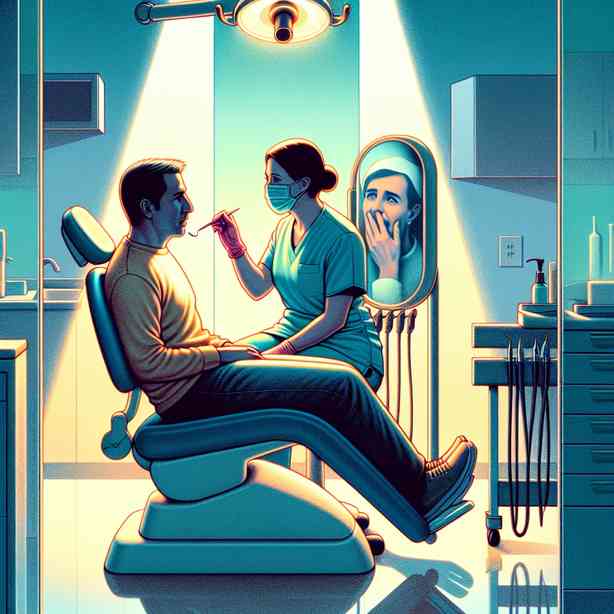
Dental visits can often evoke a mix of emotions, much like the experience of confiding in a trusted friend or exploring one’s innermost thoughts in a confession. Many patients might find themselves sitting in a dental chair, feeling vulnerable and exposed, much like they would during a moment of revelation. This analogy can be surprisingly fitting because both situations involve an element of honesty, transparency, and sometimes even anxiety.
When you first arrive at the dental office, there’s a familiar sense of apprehension that may wash over you. Just as one might feel before a confession, the dental visit often brings with it a sense of worry about what will be discovered. Will there be cavities? Will you need a root canal? Just as confessions can unveil burdens that one has been carrying, dental examinations can reveal issues that require attention, in turn addressing the fears and concerns that have been lingering in the background.
The waiting room can be a reflection of your state of mind—quiet, full of anticipation, or perhaps bustling with activity, distracting you from your own thoughts. As you sit there, taking in the sounds of other patients speaking with the receptionists, it’s common to start assessing your own dental habits. Have you been flossing regularly? Have you been diligent about your oral hygiene? This self-reflection is quite similar to the moments before a confession, where one begins to mentally catalog all the things they might need to discuss or disclose.
When your name is finally called, there’s a powerful mixture of relief and anxiety. You step into the examination room, a space that can feel both clinical and strangely comforting. The dental chair, much like a confessional booth, is designed to put you in a position of openness. As you recline back, you may feel like you are about to enter into a dialogue where honesty is paramount. It’s essential to remember that the dental team is there not to judge, but to help you understand your oral health and aid you in making better choices in the future.
Once you’re comfortably positioned, the dentist or hygienist begins to ask questions. They want to know about your dental history, your daily habits, and any concerns you may have. This is akin to the questions posed during confession—a gentle probing to understand your state of being. This inquiry allows them to build a comprehensive picture of your dental health and tailor their observations and advice to your unique situation. It’s a vital part of the process, highlighting the importance of communication in achieving optimal dental care.
As the examination progresses, the time spent in the dental chair can evoke various emotions. The sound of dental tools at work might stimulate feelings of anxiety akin to secrets being unearthed, reminding you of the importance of addressing your issues head-on. However, amidst the apprehension, the process also comes with a sense of reassurance. Knowing that a professional is examining your dental health, much like a compassionate listener, can provide comfort. Their aim is to offer solutions and innovations that support your dental wellbeing.
During this time, your dentist will likely utilize various diagnostic tools. X-rays might be taken to provide a deeper look at your underlying dental structure, much like a thorough examination of one’s thoughts during a confession. These images allow the dental team to identify problems that are invisible to the naked eye, analogous to revealing hidden worries that one may not initially recognize. The subsequent conversations will follow suit, as you and your dentist analyze the findings together.
Once the examination is completed, the dentist will discuss the results with you, laying everything out clearly and comprehensively. This is your opportunity to engage openly with them about any findings, concerns, or next steps. It’s akin to the closing of a confession, where the burden of the unknown is lifted, facilitating a healthy and constructive dialogue. The dental professional will not only convey what needs to be addressed but also how to approach these concerns moving forward. Just like a good confessor would offer guidance and support, your dentist is there to empower you with knowledge about your own dental health.
It’s important to recognize that, just as confessions can lead to a path of healing and personal growth, dental visits are essential for healthy habits and the prevention of more serious issues in the future. Regular visits can ensure that small problems do not escalate into larger, more complicated situations. By embracing the vulnerable nature of these examinations, patients can foster a healthier relationship with their oral health, progressing toward a better and more confident smile.
As we draw this exploration to a close, it’s crucial to understand that dental visits, like confessions, provide an opportunity for reflection and growth. They present an occasion to reconcile previous habits and to commit to better choices moving forward. The dentist-patient relationship is built on trust, continuous communication, and collaboration. By approaching your dental visits with an open mind and heart, you can transform what may seem like an anxious situation into a rewarding experience with long-term benefits.
Overall, the comparison between a dental visit and a confession allows us to see the depth and vulnerability associated with taking care of ourselves. Such visits are not merely check-ups; they are valuable moments of introspection and self-improvement. By fostering a culture of open communication, regular care, and mutual understanding, we can significantly enhance the journey toward a healthier mouth and a more fulfilling life. Always remember that it’s okay to share your concerns and fears during your dental visits—much like in a confession—and that your dental team is dedicated to guiding you through this process with empathy and expertise.


